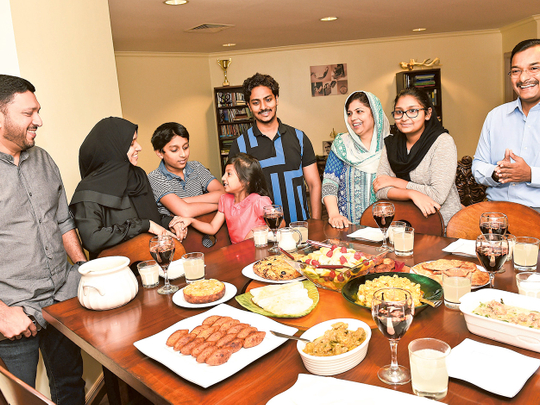
Dubai: Keralites form the majority of Indian expats living in the UAE and Malabar Muslims are arguably the majority of Malayalees here.
The cuisine of Malabar Muslims is as famous as their hospitality. When we thought of an iftar with a Malayali Muslim family, there was no better choice than that of P. K. Anwar Naha, the president of the Kerala Muslim Cultural Centre (KMCC) in Dubai.
Being the head of the largest licensed Indian community group in Dubai, Ramadan is one of the busiest months for Naha. He has to lead the charity events and iftars organized by KMCC and also organize iftars for extended family and friends at home.
The situation was no different on the day Gulf News joined his family for iftar. He told me the need to rush to KMCC soon while walking me from the entrance of the Al Ghurair Centre to his apartment in the residential tower of the mall.
As we entered the corridor towards his flat, tempting aroma of some familiar dishes welcomed me.
Naha’s wife Sajna and her sister Shafana, who lives in Al Barsha, were giving the final touches to the iftar preparations. The sisters gave a warm welcome in the Thalassery dialect of Malayalam, which is my mother tongue as well, and went inside the kitchen again.
Naha introduced me to Shafana’s husband Ziyad Arakkal Adi Raja, an IT advisor with New Kabul Bank’s outsourced IT office in Dubai. They said the sisters living in Dubai often get together for family iftar.
If Naha’s family is known for their political lineage (his father was a deputy chief minister of Kerala and his elder brother was the last education minister in the state), Ziyad is a member of the royal family of the erstwhile Arakkal kingdom in Malabar.
Naha spoke with happiness and pride about KMCC providing iftar meals to about 2000 people every day. “It is not just the needy people and poor workers in the area who are benefitting. The men who do not have their families here and those who cannot cook are the highest number of people receiving our iftars. We even have doctors from Al Baraha Hospital joining us for iftar,” he said.
Ziyad noted that Dubai is the best place to enjoy the cuisines from across the world. “But iftar at home is always a traditional affair,” he said.
That was evident when the women were helped by their children and their younger brother Neslay, who works with Naha in his shipping spare parts business, to spread the iftar items on the dining table.
Though the table was full, I was surprised that the popular Thalassery biryani was missing.
“For us, iftar is all about snacks. We don’t eat biryani much during Ramadan as we will feel very heavy. Also, when it is just our family, we don’t cook a lot to avoid food wastage,” Sajna said.
She said the family usually ends the fast by having dates and lemonade. Fresh fruits and tharikkanji (semolina drink) are also taken to give the much needed sugar rush to the fasting body. For a change, Sajna had served the Arabic drink jallab as well.
The family then went for the Maghrib prayer. Once they were back, we started savouring the rest of the delicacies spread on the table.
Unnakkaya (mashed banana rolls stuffed with sweetened egg), chatti pathiri (sweet layered rice pancake), kayappola (banana cake) were the varieties of sweet snacks while petti pathil (meat box), chicken cutlet, meen pathil (steamed rice cake with fish filling) were the non-veg snacks that were on offer.
For the main course, kunj orotti (rice dumplings in beef curry), pathiri (rice pancake) with chicken stew and pepper mutton pepper were offered. The table also accommodated a big bowl of jeeraka kanji (cumin flavoured rice porridge) which is taken late at night after the taraweeh prayers.
The absence of any vegetarian dish didn’t come as a surprise to me as I am well aware of the North Keralites’ obsession with non-vegetarian food.
Though most items were delicious and some were my own favourites, I felt either salt or pepper was less in one or two items. It was only when Sajna reminded me that I recollected with a pinch of remorse that the women had cooked all the items without tasting since they were fasting. I felt sorry for forgetting it and appreciated them for the wonderful treat they prepared without even tasting the dishes while cooking.
Shafana thanked me in return saying she was happy that Gulf News was covering her last iftar with siblings in Dubai before she and her children relocated to Kerala. “We are flying tomorrow morning. I will read about it from Kerala,” she said before we bid goodbye.











